|
|
|
Sort Order |
|
|
|
Items / Page
|
|
|
|
|
|
|
| Srl | Item |
| 1 |
ID:
127002
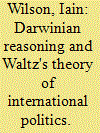

|
|
|
|
|
| Publication |
2013.
|
| Summary/Abstract |
There are important parallels between the pattern of inference Kenneth Waltz uses in his Theory of International Politics and early Darwinian reasoning. This early Darwinian thinking has needed to be significantly refined by modern evolutionary biologists, and their amendments are equally relevant to Waltz's model. Waltz allows for states to imitate each other and also accepts that they are only rarely eliminated from the system. Modern Darwinian analyses show that where elimination is rare and imitation is common, it is quite possible for deleterious behaviours to become widespread. We cannot assume an anarchic system will select for security-enhancing behaviours in major powers. Thinking about Waltz's argument in these terms opens space to disagree with his conclusions while respecting the strength of his logic.
|
|
|
|
|
|
|
|
|
|
|
|
|
|
|
|
| 2 |
ID:
110831
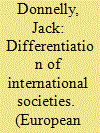

|
|
|
|
|
| Publication |
2012.
|
| Summary/Abstract |
Taking off from a recent article in this journal by Barry Buzan and Mathias Albert, I present a framework of structural differentiation as an alternative to IR's standard tripartite conception of the elements of structure. Rather than employ ideal type models, though, as Buzan and Albert do, I present a more open-textured, multidimensional account of differentiation. I also emphasize the systemic nature of structural analysis. The elements of structure are interdependent parts of wholes (systems) - not the independent variables implied by standard formulations such as 'the effects of anarchy'. A multidimensional systemic approach directs our attention to the diversity of and change in international systems and their structures, which mainstream structural IR typically ignores or obscures. I illustrate both the regularity of extensive structural change and the analytical utility of my differentiation framework with case studies of post-World War II international society and contemporary processes of globalization.
|
|
|
|
|
|
|
|
|
|
|
|
|
|
|
|
| 3 |
ID:
146241
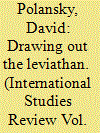

|
|
|
|
|
| Summary/Abstract |
Neo- or structural realism is famously said to lack a theory of the state. Resisting the urge to devise one, I would instead argue that structural realist theories—most notably the original theory of Kenneth Waltz—implicitly contain a theory of the state. What has eluded commentators is that this theory is prescriptive rather than descriptive. Insightful readers like Goddard and Nexon and Rathbun have unpacked Waltz’s (nondeterminative) prescriptions for state behavior in the international system. This article will unpack those prescriptions for state order. Two conclusions emerge from this analysis: (i) structural realism implicitly reads essential features of the modern state into what are otherwise proclaimed to be nonspecific like units in anarchy and (ii) the ideal-typical state prescribed by Waltz’s theory most resembles Hobbes’ Leviathan. Making these connections explicitly may indicate why certain historical systems are a better “fit” for Waltz’s analytical construct and also serves to properly situate structural realist theories within the larger framework of political (not international relations) liberalism.
|
|
|
|
|
|
|
|
|
|
|
|
|
|
|
|
| 4 |
ID:
173802


|
|
|
|
|
| Summary/Abstract |
The problematics of a rearming Japan continue to be a jigsaw given its pacifist orientation. Japan had brought about the changes in its security policy citing new security challenges posed by burgeoning China and an unpredictable nuclear North Korea, despite the US nuclear umbrella. This paper investigates as to whether Waltzian structural logic can still explain the changes in Japan’s behaviour in the post-11 September 2001 global order. Japan has used the sanction to participate in collective security to modify its military doctrine for a more active role in the use and deployment of Self-Defence Forces and acquisition of offensive weapons. Yet, despite the prevalence of necessary conditions and, as a result, the increased vulnerability to its security, Japan has not breached the nuclear threshold, as Waltzian structural logic had predicted. Japan only managed to augment its military capabilities and ease the constitutional restrictions on use of force to a certain extent.
|
|
|
|
|
|
|
|
|
|
|
|
|
|
|
|
| 5 |
ID:
104039
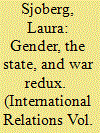

|
|
|
|
|
| Publication |
2011.
|
| Summary/Abstract |
In her recent article, 'Women, the State, and War,' in a special issue of this journal honoring Kenneth Waltz, Jean Elshtain explores the question of what if anything it does to 'put gender in' to analysis of Waltz's three 'images' of International Relations, and determines that gender is not definitive or causal in war theorizing. This article suggests that, while the question is an important and appropriate one to ask, the evidence that Elshtain brings to bear and the tools she uses to answer the question are inadequate to the task and not reflective of the current 'state of the field' of feminist International Relations. Addressing the question of if gender 'alters in significant ways' 'man, the state, and war,' this article provides theoretical and empirical examples from the young but rich field of feminist International Relations to present readers with the substance of feminist claims and the warrants behind feminist arguments. It urges International Relations to decide on the question of the relevance of gender by taking work in the area seriously, and suggests that the discipline might be convinced that acknowledging gender is crucial if scholars engage with the literature that sees 'man, the state, and war' as gendered.
|
|
|
|
|
|
|
|
|
|
|
|
|
|
|
|
| 6 |
ID:
157784
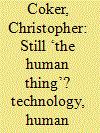

|
|
|
|
|
| Summary/Abstract |
Is war beginning to escape human control? Thucydides tells us the war is one of the things that makes us definitively human; but how long will this continue to be the case as our relationship with technology continues to develop? Kenneth Waltz’s book Man, the State and War affords one way of answering that question. So too does Nikolaas Tinbergen’s framework for understanding human behaviour and Bruno Latour’s Actor–Network Theory (ANT). The main focus of this article is the extent to which we will diminish or enhance our own agency as human beings, especially when we come to share the planet with an intelligence higher than our own.
|
|
|
|
|
|
|
|
|
|
|
|
|
|
|
|
| 7 |
ID:
117428
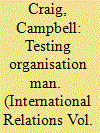

|
|
|
|
|
| Publication |
2012.
|
| Summary/Abstract |
Scott Sagan's analysis of the Cuban missile crisis in The Limits of Safety shows how accidents almost triggered a nuclear exchange during that conflict and how they are likely to cause an actual nuclear war at some point in the future. This article examines how Sagan's crucially important study affects our understanding of the salience of deterrence and non-proliferation in the post-Cold War order and the prospects of nuclear peace. The conclusion contends that Sagan's advocacy of nuclear arsenal modernisation and active non-proliferation efforts aimed at aspiring nuclear powers may well increase, rather than diminish, the chances of major nuclear war.
|
|
|
|
|
|
|
|
|
|
|
|
|
|
|
|
| 8 |
ID:
086160


|
|
|
|
|
| Publication |
2009.
|
| Summary/Abstract |
On June 6, 1982, following the collapse of a year-long truce between Israel and the Palestinian Liberation Organization, the Israeli army invaded a Lebanon torn by years of civil war. It did so after the PLO, which controlled most of the Lebanese south and had its headquarters in the western half of Beirut, had directed rocket and artillery fire at northern Israel.The PLO, for its part , was responding to an Israeli air strike on Beirut, carried out in retaliation for an attempted Palestinian assassination of the Israeli ambassador in London.
|
|
|
|
|
|
|
|
|
|
|
|
|
|
|
|
|
|
|
|
|